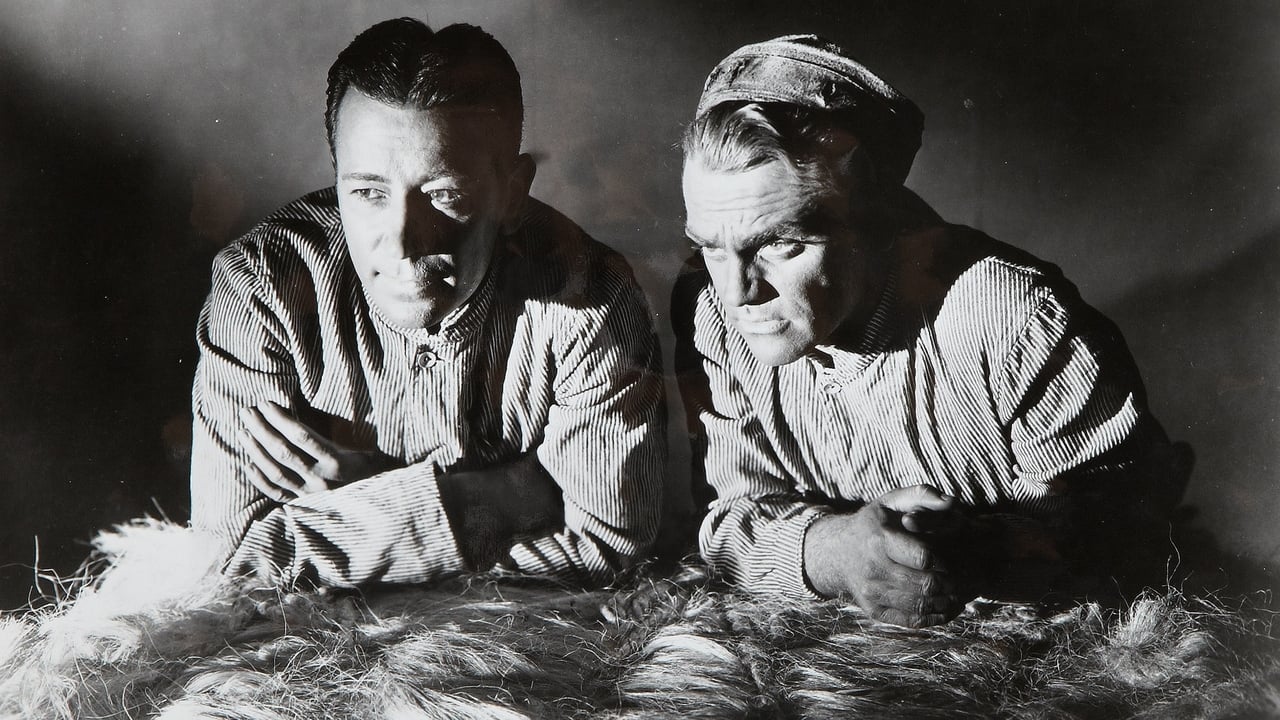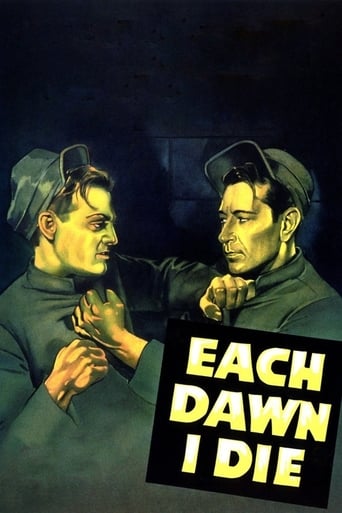Grimossfer
Clever and entertaining enough to recommend even to members of the 1%
Micah Lloyd
Excellent characters with emotional depth. My wife, daughter and granddaughter all enjoyed it...and me, too! Very good movie! You won't be disappointed.
Benas Mcloughlin
Worth seeing just to witness how winsome it is.
alexanderdavies-99382
"Each Dawn I Die" may not lend itself to realism but your typical film-goer doesn't look for plausibility in a plot. He/she is hoping to be entertained and if any part of a film is well made, then so much the better. James Cagney was now having much more of a say in his choice of films at "Warner Bros." and some of his choices between 1938 and 1942 are amongst his very best. He gives "Each Dawn I Die" everything he has got and more. He is a journalist who is a victim of an elaborate set up after he threatens to expose the District Attorney regarding allegations of corruption. Cagney finds himself found guilty on a trumped up charge of manslaughter and is sent to prison. There he struggles to maintain hope that his name shall be cleared by the hard efforts of those who believe in him. Cagney is convincing as someone who is rather vulnerable as well as being tough and is the performance to watch. Whilst in prison, he befriends convict George Raft and other inmates besides. All kinds of turmoil occur in the film's running time, not to mention the gritty moments as well. The script is perfectly OK for what the film is and the sets uses for the prison serve their purpose effectively. The build-up to the climax is very good and the climax itself is shattering. Cagney and Raft work well together and it's a shame they weren't in more films together. For Raft, "Each Dawn I Die" was one of his stronger vehicles. Watch and enjoy!
zardoz-13
"Each Dawn I Die" is a crackerjack, black & white, Warner Brothers' prison yarn expose. The Burbank studio shifted its agenda away from gangster pictures to prison pictures. Rather that lionize mobsters, they tackled the grim conditions in prisons but they relied on gangsters to maintain tension and suspense. The plot is pretty preposterous, not only for the way that our hero James Cagney is railroaded into jail and the unlikely stunt that George Raft pulls to get him out of stir. The violence is staged with such finesse that you know what happens even though you never see the outcome. When a callous prisoner guard dies at the hands of the inmates, we see the primary inmate arm himself with a curved hook. The guard tries to get away from the angry inmates, but he is pulled back into the crowd. You know that he dies and you know how he dies, but you don't see the homicidal act. Meantime, this trim 92-minute melodrama emerges as a stinging indictment of corruption both inside and outside of prison. Cagney is as pugnacious as ever, and the Warner Brothers' stock company is as strong as ever. When he fails to get the goods on crooked district attorney Jesse Hanley (Thurston Hall), Cagney lands behind bars when the district attorney frames him for manslaughter in a hit & run. When Ross's newspaper refuses to print a retraction, the D.A.'s henchmen abduct Ross, douse him with liquor, and turn him loose in a car. A dazed Cagney collides with another car, and three die in the other automobile. A solemn, forthright judge sentences Cagney to one to twenty years in the pen. Meantime, George Raft is a gangster sent up to serve life. Society is definitely flawed in this scorching melodrama. No sooner does Cagney wind up in prison than he learns the corruption runs from the D.A.'s office to prison. Director William Keighley and scenarists Norman Reilly Raine, Warren Duff, and Charles Perry don't pull any punches. Everybody on Ross' newspaper knows that he was framed, but they haven't got a shred of evidence to substantiate their contention. While Ross is locked up, he intervenes when a treacherous inmate Limpy Julien (Joe Downing) tries to kill 'Hood' Stacey (George Raft), and Stacey promises to help Ross out of his predicament. "No matter how tough it looks or how long it takes," vows Stacy, "I'll get you out." Ross agrees to confess to the Warden John Armstrong (George Bancroft) that he saw Stacy with the incriminating murder weapon. Stacey wants Ross to turn stool pigeon so he will get a trial outside of prison. During the trial, Stacey leaps out of the courtroom from the second floor and lands on a truck with a cushion so he can escape. Conditions in prison are depicted mighty. Inmates are not allowed to speak unless they are on the exercise yard. A crippled guard, Lang (Willard Robertson), who harbors nothing but contempt for the inmates pits prisoner against prisoner and loves to generate discord amongst them. After Stacy successfully dives out the window to freedom, Lang and a gang of guards beat him up in a futile effort to extract information from him. Armstrong walks in on Lang and his cronies, and he warns him in no uncertain terms of the consequences he will face. "I've told you before I will not tolerate brutality in this penitentiary. I've laid down punishment rules that are fully adequate. And as long as I'm warden, those rules will be obeyed." This is a very important dialogue exchange because it shows that prisons were not flawed institutions. Instead, prison corruption was an aberration created by disgruntled men like the prison guard. Meantime, Ross winds up in solitary confinement, handcuffed to the bars, with no hope. Armstrong visits him in solitary and promises to get him open if he will divulge the truth behind Stacy's jailbreak. A hardened Ross refuses to sing. "You haven't got a thing on me and you're not going to get a word out of me. I know where Stacy lamed to but I'm glad he made it. I'm here on a phony rap and you've no right to keep me here. You've got no right to keep me here. So get this, from now on the rules are off, I'm going to talk when I please and do what I like. I'm going to be as mean and dirty and hard to handle as the worst con in the joint, and I will skull drag any screw who gets in my way." Meantime, Ross' girlfriend Joyce (Jane Bryan) appeals to Stacey to honor his promise to Ross. At first, Stacey hated Ross because he believed the former newspaperman had double-crossed him by alerting the press about Stacey. Anyway, Stacey tracks down the man who can clear Ross, but to achieve his goal, Stacey must go back to prison. Stacey knows that one of the inmates in the pen participated in the scheme to railroad Ross. The big finale occurs when the inmates orchestrate a jailbreak, but the National Guard shows up to thwart them. Stacey corners the canary, Shake Edwards (Abner Biberman of "The Roaring Twenties" who framed Ross, and Armstrong hears the confession. The National Guard close in and toss in tear gas. Stacey bids Ross goodbye and goes out in a hail of gunfire with Shake. "Each Dawn I Die" is worth watching despite its outlandish premise.
kapelusznik18
***SPOILERS*** Brutal 1930''s prison movie with framed reporter Frank Ross, James Cagney, sent up the river for a crime he didn't commit when he was getting too close to expose D.A Jesse Hanley's, Thurston Hall, dealings with and payoffs from the mob. Given a 1 to 20 year sentence for a phony DUI charge that killed 3 people Ross is determined to prove his innocence by exposing the man who framed him D.A Hanley. To rub salt into a wound in was in fact Hanley who prosecuted him at his trial. It's when Ross gets friendly with lifer Hood Stacy, George Raft, the two concoct a perfect plan for escape. Willing to spend a month in the "Hole",solitary confinement, so he can stand trial Stacey has Ross rat him out as the person who did in stoolie Limpy Julien, Joe Downing. It was Limpy who had previously tried to knife him which Ross prevented or tripped him up him from doing. For doing that Stacey promises that he, with his outside mob connections, will find out who framed him and get him freed from prison. It's while he's to stand trial that Stacey plans with the help of his hoodlum friends to make his escape.Everything goes smoothly until at his trial, with Ross as a witness against him, that Stacy makes his escape jumping out of a three floor window and into a getaway car. But in Stacey feeling that Ross betrayed by tipping off his friends at the paper he worked for to be there to get the big scoop that could have jeopardized his escape plan. Now feeling that he owes Ross nothing, in finding out who framed him, Stacey goes on his merry way as Ross, who's suspected in setting up Stacey's escape, is left hanging.***SPOILERS*** It's Ross' girlfriend and fellow reporter Jane Bryan, Joyce Conover, who gets Stacey to change his mind about Ross and thus now plans to give himself up and get a chance , while behind bars, to set things right or kiss and make up between him and Ross. This soon leads to a prison brake where almost the entire prison population ends up getting gunned down by the police and national guard that finally has a fatally wounded Stacey get the person who framed Ross a hood named Carlisle, Alan Baxter. It's Carlisle who just happened to be one of the inmates in the prison! I guess former D.A and now Governor Hanley couldn't or wouldn't give him a pardon. With his job in forcing Carlisle to confess to the prison warden Armstrong, George Bancroft, who was being held hostage Stacey ended his good deed by proving Ross innocent and ends up going down for the count in a blaze of police and national guard bullets.P.S Believe it or not "Each Dawn I Die" just happened to be Soviet Dictator Joseph "Uncle Joe" Stalin's favorite movie. Stalin must have enjoyed it so much because it reminded him of the prison or gulag system that he had set up in the Soviet Union that he loved so much.
AaronCapenBanner
William Keighley directed this memorable prison drama that stars Jimmy Cagney as newspaper investigative reporter Frank Ross, who was looking into political corruption and racketeering when he is knocked out, then framed for manslaughter after they make it look like he was a drunk driver. Frank at first handles this injustice with his head held high, but despite his paper's determination to prove his innocence, he grows increasingly bitter and despondent as time passes, and he is subjected to isolation. He does befriend gangster Stacy(played by George Raft) whom he helps escape to prove him innocent, but that help comes at a high price... Well-acted and compelling film may not be entirely realistic, but viewer will likely overlook that because of the storytelling skill on display here, and features one of Cagney's best performances.

